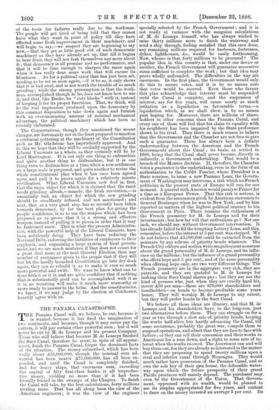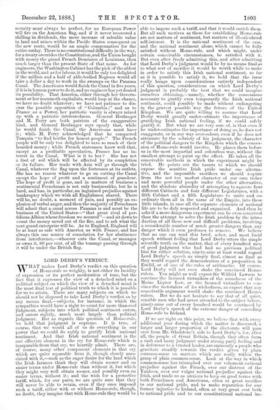THE PANAMA CATASTROPHE.
THE Panama Canal will, we believe, be cut, because it is wanted, because it has fired the imagination of two continents, and because, though it may never pay the cutters, it will pay certain other powerful men ; but it will never be cut by M. de Lesseps and his present Company. Those who still believe that because M. de Lesseps finished the Suez Canal, therefore he must, in spite of all appear- auces, finish the Panama Canal, forget the dominant facts of the situation. The money subscribed, which has been really about 155,000,000, though the nominal sum ad- vanced has been nearer 175,000,000, has all been ex- pended, and until the Canal is completely finished, and for heavy ships, that enormous sum, exceeding the capital of fifty first-class banks, is all unproduc- tive money, yielding no more than if it had been literally buried in the swamps of the Chagres. To finish the Canal will take, by the best calculations, forty millions sterling more. That has all along been the view of the American engineers ; it was the view of the engineer specially selected by the French Government ; and it is not really at variance with the sanguine calculations of M. de Lesseps himself, who has always wished to raise thirty millions more to finish the waterway and send a ship through, feeling satisfied that this once done, any remaining millions required for harbours, fortresses, dykes, lighthouses, &c., would be easily forthcoming. Now, whence is that forty millions to be procured ? The popular idea in this country is that, under one device or another, the French Government will guarantee successive sums sufficient to complete the work ; but that idea may prove wholly unfounded. The difficulties in the way are enormous. In the first place, the Government would only do this to secure votes, and it is by no means sure that votes would be secured. Even those who favour this plan acknowledge that interest must be suspended until the Canal is complete, and the suspension of interest, say for five years, will cause nearly as much irritation as a liquidation on favourable terms,—a liquidation which, as we shall show, is by no means past hoping for. Moreover, there are millions of share- holders in other concerns than the Panama Canal, and every one of these will feel that his claim to equality with his neighbour has been impaired by the State preference shown to his rival. Then there is much reason to believe that the Government and the Chamber are not free to give such a guarantee. There has always been a definite understanding between the American and the French Governments about this Canal ; its basis, as settled in 1880, being that the Canal shall never become, directly or indirectly, a Government undertaking. That would be a breach of the Monroe doctrine. If, therefore, the Chamber votes a guarantee to the undertaking, even in the form of an authorisation to the Credit Fon.cier, whose President is a State nominee, to issue a new Panama Loan, the Govern- ment of Washington may intervene, a risk which no French politician in the present state of Europe will run for one moment. A quarrel with America would paralyse France for a time as a European Power. That this risk is serious, is evident from the assurances given by American statesmen to General Boulanger when he was in New York, and by him reported as matters of the highest political urgency to his Government in Paris. There remains the enthusiasm of the French peasantry for M. de Lesseps and for their investments ; but how far will that enthusiasm go ? Not one inch, we should say, without Government intervention. It has already failed to fill the tempting Lottery Loan, and this, remember, before the interest at 5 per cent, was stopped. We do not believe that 15,000,000 could be extracted from the peasants by any scheme of priority bonds whatever. The French City editors and scribes write magniloquent nonsense about the grand personality of M. de Lesseps, and its influ- ence on the millions ; but the influence of a grand personality who offers hope and 5 per cent., and of the same personality when offering hope only, are two very different things. The French peasantry are in the aggregate very rich, they are patriotic, and they are grateful to M. de Lesseps for making their Suez Canal shares pay ; but they are not the kind of persons who, just when they are cruelly hard hit, invest 150 per man—there are 870,000 shareholders and bondholders—on bonds to become profitable some years hence. They will worship M. de Lesseps to any extent, but they will prefer bonds in the Suez Canal.
We believe all these ideas are illusory, and that M. de Lesseps and his shareholders have, in the long-run, just two alternatives before them. They can struggle on for a year or two through a slow sale of priority bonds, keeping the works half-alive, but hardly advancing the Canal, till some occurrence, probably the great war, compels them to suspend operations, and admit that they are face to face with failure ; or they can sell their concession and their works to Americans for a sum down, and a right to some rate of in- terest when the works succeed. The Americans can and will buy them out, for they are already so interested in the matter that they are proposing to spend twenty millions upon a rival and inferior canal through Nicaragua. They would much rather have possession of the Panama Canal, and so own the sole key of their oivn house, the defensible water- way upon which the future prosperity of their grand Pacific provinces will mainly depend. The purchaser may even be the Goverhment of the -Union. That Govern- ment, oppressed with its wealth, would be pleased to see its surplus appropriated for five years, and content to draw on the money invested an average 3 per cent. Its security must always be perfect, for no European Power will fire on the American flag, and if it never recovered a shilling in dividends, the mere increase of saleable value in land and mines within the Pacific States consequent on the new route, would be an ample compensation for the entire outlay. There is no constitutional difficulty in the way, for a treaty overrides the Constitution, and. the Union bought with money the grand French Dominion of Louisiana, then much larger than the present State of that name. As for engineers, the Washington Cabinet has the pick of the ablest in the world, and as for labour, it would be only too delighted if the million and a half of able-bodied Negroes would all take a dollar a day to work in the swamps on the Panama Canal. The Americans would finish the Canal in five years, if it is in human power to do it, and no engineer has yet denied its possibility. That America, either through her Govern- ment or her mammoth capitalists, would leap at the chance, we have no doubt whatever ; we have not patience to dis- cuss the possible opposition of " Columbia ;" and as to France as a Power, her patriotic vanity is always mixed up with a patriotic interestedness. General Boulanger and M. Ferry are both patriots of the exaggerative kind, and General Boulanger says openly that, while he would finish the Canal, the Americans must have it ; while M. Ferry acknowledged that he conquered Tonquin "to find berths for honest people." The French people will be only too delighted to save so much of their hoarded money ; while French statesmen know well that, except as a profitable speculation, France has no in- terest in the Canal. What is it to her ? She has not a foot of soil which will be affected by its completion or its failure. Her trade with Asia will go through the Canal, whatever the flag upon the fortresses at its outlets. She has no reason whatever to go on cutting the Canal except the hope of profit and a sentiment of grandeur. The hope of profit is gone, and in matters of business a sentimental Frenchman is not only businesslike, but he is hard, and has, in particular, an ingrained prejudice against bankruptcy which we wish all Englishmen shared. There will be, no doubt, a moment of pain, and possibly an ex- plosion of verbal anger, and then the majority of Frenchmen will admit that a canal across Panama is and must be the business of the United States—" that great rival of per- fidious Albion whose freedom we secured"—and sit down to count the money saved out of the fire, and to ask what the next grand enterprise will be. As to England, England will be at least as safe with America as with France, and has always this one source of consolation for her abstinence from interference,—whoever cuts the Canal, or manages or owns it, 80 per cent. of all the tonnage passing through it will be under the British flag.











































 Previous page
Previous page